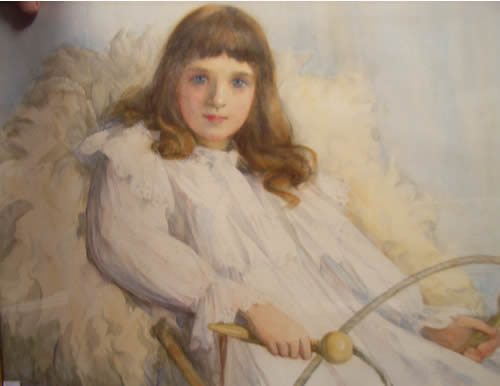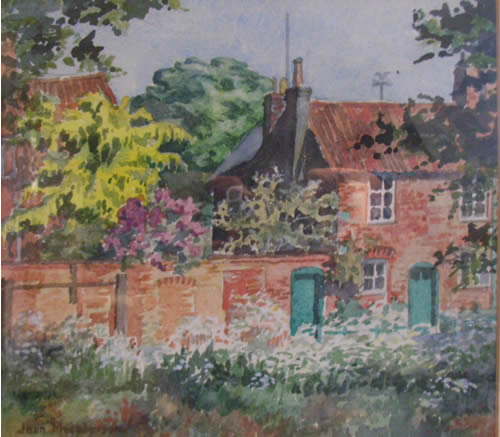Fanny Foster 1891- 1975
Southwold's 'Leading Lady'

Fanny as a young girl with hoop and skipping rope. A watercolour portrait by K. Sturgem
Georgiana Fanny Julia Foster was one of Southwold's legends and a charismatic contributor to the community. She was the only child of a Norwich solicitor in his sixties and his wife, Gertrude, who was in her forties.
The family moved to Southwold when Fanny was a few years old and she attended St Felix School where she proved to be an academically talented child with a gift for languages and the violin. In due course she attended Newnham College, Cambridge but had to return to Southwold to care for her by now frail mother. She did so for the next decade.
With her academic career cut short, she threw herself instead into learning to become a serious photographer and, to pay her way, took a job as secretary and part-time violin teacher at her old school.
During the Balkan crisis Fanny provided a home to a refugee Yugoslavian boy. She taught him English and learned from him the rudiments of Serbo-Croat. The culture, literature and language of Yugoslavia were to become a lifelong passion.
When her mother died in 1922 she moved out of the family home in Strickland Place, Park Lane, to the nearby Park Lane Cottage which had been the home of her father's coachman, Richard Poppy.

The garden of Park Lane Cottage painted by Joan Macpherson
Now free of ties and with an assured income from an uncle's bequest, she took herself off on a photographic expedition to New Zealand aboard a cargo vessel.
Fanny's knowledge of Serbo Croat led to close ties with the Yugoslavian government and, over the following years, she became deeply involved in the country's cultural projects. King Peter II awarded her the Order of St Sava for her work. The medal is in the museum.
The Southwold Museum and its parent society was a particular love of Fanny Foster who was its treasurer from its beginning in 1933. She was also a leading light in innumerable other local orgasnisations as well as being a Justice of the Peace.
During the Second War Fanny worked for the War Ministry censorship department, using her Serbo-Croat knowledge to translate correspondence from Eastern Europe.
In later years Fanny devoted herself to the conservation of Southwold, fiercely resisting inappropriate development. She served on Southwold Borough Council for 32 years. She sat on numerous committees, was Chairman of the Borough Housing Committee and became one of the Town's most famous Mayors. She was made an honorary Freeman of the Borough in 1971 for "her untiring service to Southwold and vigilance in seeking to preserve all that is good in the life and character of the Borough".
A much fuller account of Fanny Foster's life is given in Margot Strickland's booklet: 'I am Southwold' - The Story of Fanny Foster, available in the Museum Shop.